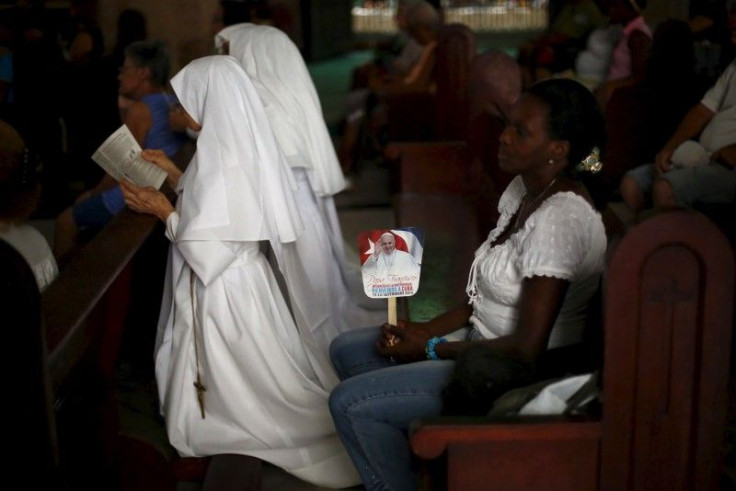Pope To Witness Impact Of US-Cuba Detente He Helped Spur

HAVANA (Reuters) - Pope Francis begins a nine-day tour of Cuba and the United States on Saturday where he will see both the benefits and complexities of a fast-evolving detente between the old Cold War foes that he helped broker.
Better sensitized to the issue than predecessors because of his Latin American roots, the 78-year-old Argentine pontiff facilitated a back channel for talks and sent missives to Presidents Raul Castro and Barack Obama in 2014.
That bore fruit with this year's re-establishment of diplomatic ties and the easing of some travel and trade restrictions though a half-century-old economic embargo is still in place, only removable by the U.S. Congress.
"We all want to say thank you so much Francis for helping us end this absurd situation we have endured for so long," said plumber Osmany Lopez, 63, who planned to be on the streets of Havana to see Francis' motorcade from the airport on Saturday.
Raul Castro - who like his brother and former revolutionary leader Fidel Castro was baptized as a Catholic and educated by Jesuits - was expected to greet Francis at the airport. It will be the third papal visit to Cuba in less than two decades.
Despite making Cuba constitutionally atheist and repressing Catholics in the early years after their 1959 revolution, the Castro brothers have relaxed that stance since the 1990s.
Raul Castro even told the Jesuit Francis earlier this year he may start praying again and return to the Church.
MOMENTUM FOR CHANGE
The pope is to celebrate Mass in Havana, Holguin and Santiago before flying on Tuesday to the United States, where he will meet Obama and address both the U.S. Congress and United Nations.
Having helped bring the U.S.-Cuba rapprochement, he is unlikely to wade much further into the future of relations where a web of legislation, vested interests, and decades-old resentments are braking the pace of change.
But Francis may well use the Cuba leg to touch on the Vatican's well-known opposition to the U.S. embargo. He might also call for greater political tolerance from the ruling Communist Party, which still treats dissidents as pariahs.
In a video chat with Cuban students, shown by broadcaster CNN on Friday, the pope referred to a potentially touchy subject for his Cuban hosts, saying leaders who did not promote other leaders "are no good, they are dictators."
But in a formal message to Cubans prior to his arrival, the pope stuck to a strictly non-political script: "My message is very simple: Jesus loves you very much," he said.
An estimated 60 percent of Cuba's 11 million people are baptized Catholic, the Church says, but fewer than 5 percent regularly attend church, and at least an equal number are believed to follow Afro-Cuban religions and
"I'm a devout 'Santero' - the Church is for old people!" laughed Eduardo Gutierrez, 19, sitting with his girlfriend on Havana's languid seafront. "But after what Francis has done for us, I am going to Revolution Square to show him my respect."
© Copyright IBTimes 2024. All rights reserved.





















